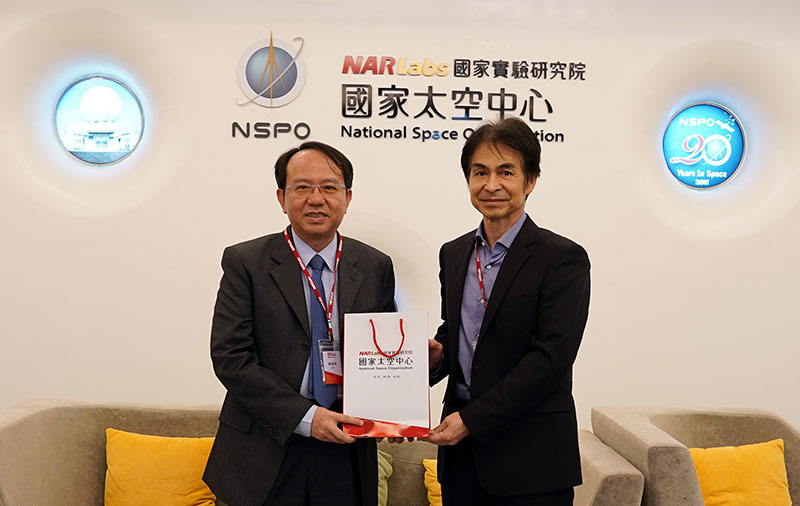Issued Date:2020/03/05
Issued by: iST
To speed up the implementation of the phase 3 of long-term development program for space science and technology and promote the development of the domestic space industry, the National Space Organization of NAR Lab (hereinafter referred as NSPO) and iST entered an MOU of partnership today (March 5) to start joint work on the “space parts inspection and verification.” iST, a third-party laboratory for verification and tests of electronic industry, is aimed at assisting domestic suppliers willing to enter the space industry in ensuring their products’ quality and reliability based on iST’s 25 years of verification and analysis experience in the IC components industry. NSPO is to help iST in building up its space electronic components’ verification and certification capacity.

Photo: iST signed a MOU with NSPO to start joint work on space parts verification. (Right:Jun-Liang Lin, the director of NSPO; Left: Danny Yu, chairman of iST)
Space electronic components shall be verified successfully in the simulation environment on the ground before being subjected to tests in the real space environment for their functions and reliability. The main test items over space electronic components contain the vibrations and shocks when launching the rocket, the severe thermal cycles and vacuum environment in space and resistance against radiation, as the latter in the space environment may result in electronic components’ temporary failure or even permanent damage.
iST is partnering with NSPO and relevant domestic labs to provide comprehensive verification planning and testing. This function specialization is enabling the electronic components suppliers to focus on product development and manufacturing while leaving their space specification verification and test to iST.
Danny Yu, chairman of iST, noted that iST is leading its Asian competitors in the verification and test skills for the IC industry. iST has assisted more than 1000 suppliers in getting their products verified and tested successfully to march into relevant supply chains of products including consumer goods, automotive electronics, and 5G and AI (Artificial Intelligence) related electronics.
He further pointed out that global tech giants are scrambling to invest in the space industry and planning to launch tens of thousands of satellites for communication or even space trips in the next decade. The key issues faced by those eager to get into the industry is their lack of knowledge on space grade products’ quality and verification specification in spite of profound experience in their manufacturing. The strategic partnership with NSPO is aimed to be part of the space plan. That is, to build up a domestic space electronic parts verification platform to work with manufacturers intending to engage in the space industry to rocket into space.
The cooperation agreement with Linkou Chang-Gung Memorial Hospital, and Chang-Gung University in July last year entitles NSPO to use the Linkou Chang-Gung Memorial Hospital’s 200 MeV high-energy proton equipment for single event effect testing; the alliance with the Institute of Nuclear Energy Research (INER), the Atomic Energy Council, in November entitles NSPO to use the INER’s 30 MeV cyclotron for electronic components’ radiation cumulative effect testing. By joining in this partnership the iST may improve the efficiency of electronic components verification, shorten times required by domestic suppliers to get into the space industry, as well as to shape up a more comprehensive radiation test environment in Taiwan to support the development of the space program.
Jun-Liang Lin, director of NSPO, suggests that with fairly complete supply chains in precision machinery, electrical machinery, communications, and semiconductors, Taiwan’s industries are blessed in developing its space sector. The “National Space Program—Phase 3” approved by the Executive Yuan on January 15, 2019 is set to launch 10 satellites in 10 years by NSPO from 2019 to 2028. One of the goals of the program is to promote the development of Taiwan’s space industry which, in turn, would employ most of the key space components developed by domestic industry, university, and academia as well as to assist the local manufacturers into the international space industry supply chain.
About Integrated Service Technology
Founded in 1994, iST began its business from IC circuit debugging and modification and gradually expanded its scope of operations, including failure analysis, reliability verification, material analysis and so on. iST has offered full-scope verification and analysis services to the IC engineering industry, its customers cover the whole spectrum of the electronics industry from IC design to end products.
In response to rising Cloud Intelligence, Internet of Things (IoT) and Internet of Vehicles (IoV), iST not only focuses on its core services but is also expanding its service offerings based on international trends, such as automotive electronic verification platforms, signal integrity testing services and wafer backend process integrated services.
http://www.istgroup.com
